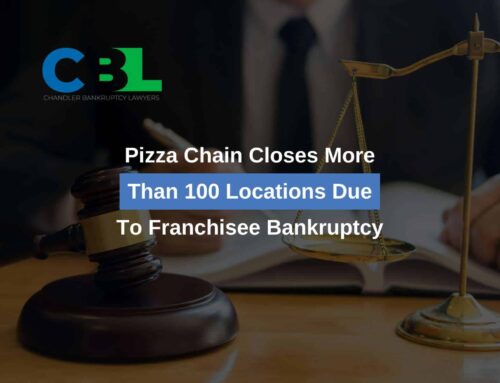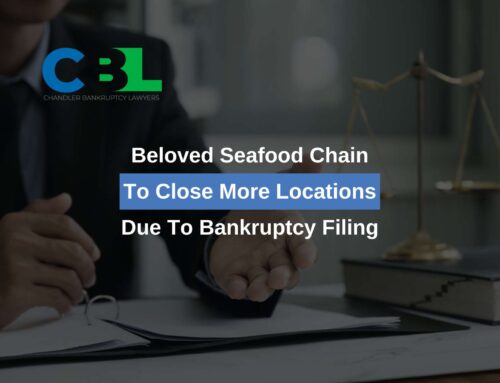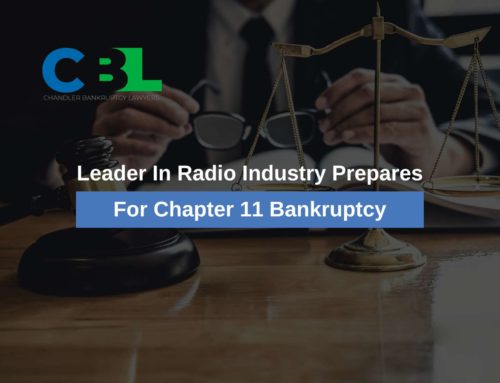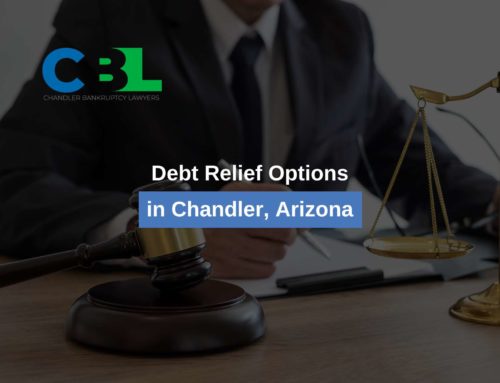What Is The Minimum Debt Required For Filing for Bankruptcy
Even relatively small amounts of debt can jeopardize your financial situation and entire way of life. Many American families live paycheck to paycheck, so unexpected setbacks can have much more serious consequences. Falling even one month behind on a bill could mean swift action by your creditors. But you might not have enough debt to justify filing bankruptcy. Read on to learn about some possible considerations, and click here if you’d like to schedule a free consultation with a skilled Arizona bankruptcy lawyer.
Why You Might Need The Automatic Stay
If you don’t have a large amount of debt, you might be looking into filing bankruptcy because of the automatic stay. This is because the automatic stay can provide crucial protections when you are struggling with debt. Upon filing your bankruptcy petition, the automatic stay stops wage garnishments, bank levies, foreclosure and repossessions, utility shutoffs, lawsuits, and more. Most of the time, the automatic stay will last until your case is discharged- you can find more information about how long that might be below.
There may be limitations to what the automatic stay can do for you. For example, filing Chapter 7 bankruptcy won’t stop a wage garnishment stemming from back child support. Only a Chapter 13 bankruptcy filing with a plan that arranges for full repayment will stop this type of wage garnishment. Your creditor may also ask the court for permission to continue with collection despite the automatic stay being in good standing. This is done through a Motion for Relief from the Automatic Stay. A high quality bankruptcy attorney will alert the potential for these types of issues, and help navigate you through how to best deal with them.
Bankruptcy Debt Minimums
There is no standard minimum debt required to qualify for bankruptcy. Technically, if you wanted to, you could file bankruptcy to discharge a $1 debt. But filing bankruptcy is complicated, has serious consequences, and comes with significant costs. The filing fees alone are $338 for Chapter 7 bankruptcy, and $313 for Chapter 13 bankruptcy. The expenses associated with hiring a bankruptcy lawyer are usually even higher. Therefore, it usually isn’t worth it to file bankruptcy unless you have at least several thousands of dollars in debt.
Bankruptcy isn’t as quick of a process as many people believe it to be. Chapter 7 bankruptcy generally takes anywhere from 3 to 6 months. A Chapter 13 bankruptcy payment plan lasts 3 or 5 years. It can also have a serious impact on your credit and disqualifies you from buying a home for 2 years. You will also be ineligible to discharge debts in bankruptcy again for a certain number of years, which could be when you really need it if you didn’t wait long enough to file. When your first bankruptcy is a Chapter 7, you will need to wait 8 years to file another Chapter 7 bankruptcy, and 4 years to file a Chapter 13 bankruptcy. When your first bankruptcy is a Chapter 13, you will need to wait 2 years to file another Chapter 13 bankruptcy, and 6 years to file a Chapter 7 bankruptcy.
Student Loan Debt
For many people, their largest debt is from their student loans. Before the pandemic, we had several people coming to us hoping bankruptcy could help with student loans, or at least the wage garnishment attached to them. Unfortunately, it is extremely rare for someone’s student debt to be discharged in bankruptcy. The most commonly used test to determine if someone is eligible to discharge their student loans in bankruptcy is the Brunner Test. The Brunner Test provides three requirements a debtor must meet to discharge their student loan debt: if required to repay the loan, you won’t be able to maintain a minimal standard of living; your financial situation is unlikely to change; and you have made a good-faith effort to repay your loan. While you may think you meet these requirements, student loans are discharged in a microscopic percentage of bankruptcy cases.
After the student loan pause ends, your wages may end up being garnished for them at some point in the future. While bankruptcy may not clear your student loans, it can at least pause a wage garnishment associated with them. If you declare Chapter 7 bankruptcy, the garnishment will resume when your case is dismissed or discharged, which usually takes 3-6 months. If you file Chapter 13 bankruptcy, some of your student loans may be paid in your payment plan. Your payment plan will last either 3 or 5 years. The garnishment may or may not resume when your payment plan is complete, depending on how much progress you make on the balance.
Domestic Obligations Debt
If you fail to make your child or spousal support payments, you will accrue debt, as well as interest. The family law judge assigned to your case may be willing to modify your payments going forward but can’t retroactively modify support arrearages. These debts also can’t be discharged in bankruptcy. You can use Chapter 13 to pay off any back child or spousal support you may owe, but these obligations will remain untouched by a Chapter 7 bankruptcy filing.
Social Security Income
If you’re facing threats by creditors to garnish your wages or levy your bank account, you may not need to file bankruptcy if you live on SSI. Social security income is exempt from these types of collections by your creditors. However, if you have creditors breathing down your neck, it’s important that you take steps to make sure your income and bank accounts remain protected from your creditors.
Your social security check is generally exempt from creditors and can’t be garnished. However, the bank account you deposit it into could still be at risk. Your bank account could be mixed with funds that aren’t exempt from creditors, like if you have a part-time job or your children wire you $500 per month. Only the amount that doesn’t come from exempt SSI can be levied, but that can be complicated and result in unintentional error by your creditor. Even if you mostly live off of SSI, you should still discuss your debt situation with an attorney if you are being harassed by creditors.
Discuss Your Situation with an Experienced, Knowledgeable Arizona Bankruptcy Lawyer
You can read all the articles about bankruptcy in the world, but none of them will give you a straight answer about whether or not you should declare bankruptcy. The good news is that our experienced Arizona bankruptcy team offers free consultations to discuss your debt and finances, allowing you to make an education decision about filing bankruptcy. Our consultations are free, confidential, and can be held by phone- that means you can get started on a new financial future without even putting on your shoes. You can also come into one of our convenient office locations if you prefer the in-person experience.
We can provide an honest opinion on if you are a good candidate for bankruptcy, or if another form of debt relief might be more appropriate. If bankruptcy can help you and we’re the right firm for you, you can see if you qualify for our $0 Down financing bankruptcy payment plans. Our bankruptcy lawyers aren’t here to judge- they’re here to help. Call 480-470-1504 or click here to schedule your free initial consultation today.

1731 West Baseline Road #101
Mesa, Arizona 85202
Phone:(480) 448-9800
Additional Assistance is Available from our Arizona Bankruptcy Experts:
Gilbert Bankruptcy Attorneys
Tucson Bankruptcy Lawyers
Glendale Bankruptcy Lawyer
Chandler Bankruptcy Lawyer
Tempe Bankruptcy Lawyers
Arizona Bankruptcy Attorneys
Peoria Bankruptcy Lawyers






